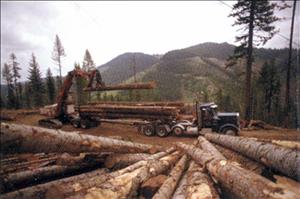Forest Practices Act becomes law, laying the groundwork for protecting water, fish, and wildlife while maintaining our timber industry.
On January 1, 1946, the Forest Practice Act requires Washington loggers to plant trees to replace the logs that they have harvested. The State Division of Forestry is empowered to enforce the provisions and a nine-member board will adopt rules to protect soils, water, fish, wildlife, and public capital improvements from the impacts of logging. Some timber interests oppose the statute and appeal its constitutionality to the United States Supreme Court. The court upholds the law.
The Forest Practice Act was replaced in 1974 by a new Forest Practices Act, which Washington Environmental Council (now Washington Conservation Action) helped to pass, which provided a mechanism for more complex rulemaking to govern forestry.

